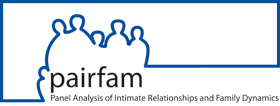Concept und Design
The conceptual framework of the German Family Panel, its theoretical background, research design, and thematic priorities are described in an article by Huinink et al. (2011) published in the Journal of Family Research. This reference paper is intended to serve as an introduction for those interested in the pairfam project and as a common reference point for all publications that are based on German Family Panel data.
→ Reference Paper
The Technical Paper No. 01 describes the pairfam design. Furthermore, it provides a summary of sampling and response rates. Finally, it compares pairfam with other benchmark data.
→ Technical Paper No. 01
The broad framework of the life course perspective facilitates a common theoretical approach to the various thematic areas of the German Family Panel. At the same time, it is flexible to be augmented by substantive middle-range theories and open to different disciplinary perspectives as they prove useful in elaborating the processes involved. Among the basic principles of the life course approach for modeling individual decisions are the multilevel localization of individual resources, the multi-dimensionality of life domains, the path dependency of previous decisions, the anticipation of future conditions, the interdependencies between actors, and their bounded rationality in decision-making.
→ Theoretical Approach (in German)
The need for reliable data on the long-term development of partner and generational relationships necessitates a complex study design: The pairfam design follows a multi-cohort approach with so-called anchor persons at the center. These anchor persons were selected randomly from all persons living in private households in Germany born in the three cohorts 1991-93, 1981-83, and 1971-73, a restocking and refreshment sample in wave 11 has added the cohort 2001-03. The design implements a multi-actor approach, i. e. the anchor's partner and - from the second wave onwards - also the anchor's parents and/or stepparents plus children at the age of 8 to 15 living in the household (former children participants above the age of 15 as "step-up" anchor persons ) are additionally included in the survey. Crucial element of the pairfam design is its panel approach with yearly repeated interviews of the anchor persons and their partners, parents, and children. The German Family Panel is scheduled to run for 14 years, ending in 2022. The initial sample of wave 1 (2008/09) consists of 12,402 anchor persons of the three birth cohorts plus 3,743 partners.
→ Sample Development




